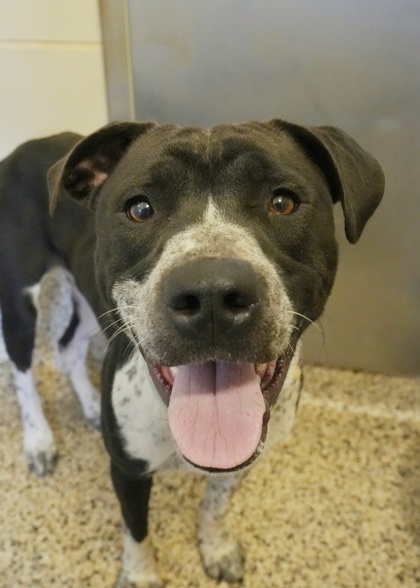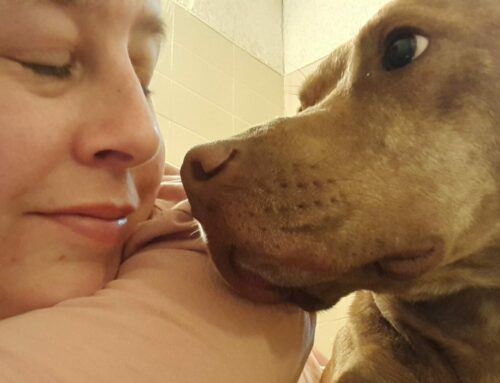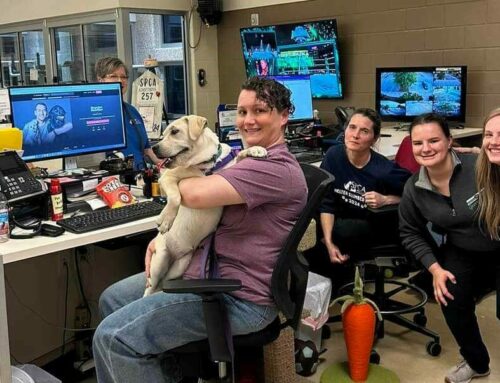By: Sarah A. Neikam, CAWA
In a perfect world, every pet would find its forever home from the start, and live out their lives with the same loving family. Unfortunately, pet owners sometimes find themselves in situations where they can no longer care for their beloved pets. Surrendering or rehoming a pet is a heartbreaking decision, but it’s crucial to approach this responsibly, considering the pet’s well-being and the impact on local animal shelters.
Animal shelters play a vital role in providing care for stray and abandoned pets. However, shelters are often operating at or over their capacity. Introducing more pets adds significant strain to their resources. Moreover, shelters, despite best efforts by caring staff and volunteers, can be stressful environments for pets. They are suddenly in unfamiliar surroundings, surrounded by unfamiliar animals, sounds, smells and people, which can be overwhelming, particularly for pets used to a home environment.
Before considering surrendering a pet to a shelter, exhaust all other possibilities. There are resources available that may help you keep your pet.
Many pets are surrendered for behavior issues that could be resolved with proper training. Professional trainers can offer invaluable assistance in addressing common problems like aggression, barking, or house-training issues. If the expense of a professional trainer is an obstacle, turn to YouTube for pet training videos. Often, your pet just needs some guidance and structure to correct their behavior.
Sometimes, behavioral issues stem from underlying health problems. If your normally friendly dog is now snapping or growling at familiar people, he may be experiencing pain. If your cat is urinating outside of the litter box, she may be suffering from an infection. A visit to the vet can rule out or treat any medical issues that might be causing unusual behavior.
Financial difficulties are a common and understandable reason why some pet owners consider surrendering their pets. But it’s important to explore available resources that can help before making a final decision. Many communities offer low-cost veterinary care options, like the Veterinary Care Center operated by the SPCA Albrecht Center for Animal Welfare, which provides affordable spay and neuter surgeries and a walk-in wellness clinic.
Additionally, some shelters operate pet food banks and charitable organizations often offer assistance with pet food and supplies. By seeking out these resources, pet owners may find that they can continue to care for their pets despite financial hurdles.
If none of these options are helpful and keeping your pet is just not feasible, attempt to rehome them before turning to a shelter. Rehoming allows your pet to transition from one home to another, bypassing the stress of a shelter.
Start by asking trusted family and friends if they, or someone they know, can provide a loving home for your pet. Websites like Rehome by Adopt-a-Pet, Home to Home, and local community social media pages are excellent resources. They allow you to reach a broader audience and find someone actively looking to adopt.
When you do find a potential new home, take the time to ensure it’s a good fit. Discuss the pet’s needs, your expectations, and possibly conduct a home visit. Rehoming websites also recommend charging a reasonable rehoming fee to ensure the adopter is making a thoughtful decision.
Surrendering or rehoming a pet is not a decision to be taken lightly. It’s a commitment to ensuring that, even if you can no longer care for them, your pet continues to live a happy, healthy life. By considering alternatives and responsibly rehoming, you’re not only helping your pet but also supporting animal shelters in their mission to care for animals most in need.
Remember, if you can no longer care for your pet, a shelter should be the very last resort after all other avenues have been explored.
Sarah Neikam is the Marketing Director for the SPCA Albrecht Center in Aiken, SC. She has been with the organization since 2012, holding various roles including Volunteer Coordinator and Director of Operations & HR. A Certified Animal Welfare Administrator as of 2022, Sarah is a passionate advocate for animal welfare. She resides in Aiken with her husband, Tom, and their six cats.







